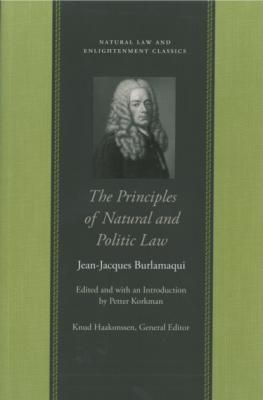ТОП просматриваемых книг сайта:
The Principles of Natural and Politic Law. Jean-Jacques Burlamaqui
Читать онлайн.Название The Principles of Natural and Politic Law
Год выпуска 0
isbn 9781614871835
Автор произведения Jean-Jacques Burlamaqui
Жанр Философия
Серия Natural Law and Enlightenment Classics
Издательство Ingram
Of the principles from whence reason may deduce the law of nature.
Sect. 1. From whence are we to deduce the principles of the law of nature?
Sect. 2. Preliminary remarks. What we understand by principles of natural law.
Sect. 3. Character of those principles.
Sect. 4. Whether we ought to reduce the whole to one single principle.
Sect. 5. Man cannot attain to the knowledge of natural laws, but by examining his nature, constitution, and state.
Sect. 6. Three states of man.
Sect. 7. Religion: principle of the natural laws, that have God for their object.
Sect. 8. Consequences of this principle.
Sect. 9. Self-love: the principle of those natural laws which concern ourselves.
Sect. 10. Natural laws derived from this principle.
Sect. 11. Man is made for society.
Sect. 12. 1. Society is absolutely necessary for man.
Sect. 13. 2. Man by his constitution is very fit for society.
Sect. 14. 3. Our natural inclinations prompt us to look out for society.
Sect. 15. Sociability. Principles of natural laws relative to other men.
Sect. 16. Natural laws which flow from sociability.
1. The public good ought always to be the supreme rule.
2. The spirit of sociability ought to be universal.
3. To observe a natural equality.
4. To preserve a benevolence even towards our enemies. Self-defence is permitted, revenge is not.
Sect. 17. Particular consequences.
Sect. 18. These three principles have all the requisite characters.
Sect. 19. Remarks on Puffendorf’s system.
Sect. 20. The critics have carried their censures too far against him in this respect.
Sect. 21. Of the connexion between our natural duties.
Sect. 22. Of the opposition that sometimes happens between these very duties.
Sect. 23. Natural law obligatory, and natural law of simple permission. General principle of the law of permission.
Sect. 24. Two species of natural law; one primitive, the other secondary.
CHAPTER V
That natural laws have been sufficiently notified; of their proper characteristics, the obligation they produce, &c.
Sect. 1. God has sufficiently notified the laws of nature to man.
Sect. 2. Men may assist one another in this respect.
Sect. 3. The manner in which the principles of the laws of nature have been established, is a fresh proof of the reality of those laws.
Sect. 4. Natural laws are the effect of the divine goodness.
Sect. 5. The laws of nature do not depend on arbitrary institution.
Sect. 6. Our opinion is not very wide from that of Grotius.
Sect. 7. The effect of the laws of nature, is an obligation of conforming our conduct to them.
Sect. 8. Natural laws are obligatory in respect to all men.
Sect. 9. Grotius’s opinion with regard to divine, positive, and universal law.
Sect. 10. Natural laws are immutable, and admit of no dispensation.
Sect. 11. Of the eternity of natural laws.
CHAPTER VI
Of the law of nations.
Sect. 1. How civil societies are formed.
Sect. 2. The civil state does not destroy, but improve the state of nature.
Sect. 3. True ideas of civil society.
Sect. 4. States are considered under the notion of moral persons.
Sect. 5. What is the law of nations.
Sect. 6. Certainty of this law.
Sect. 7. General principle of the law of nations; what polity consists in.
Sect. 8. Inquiry into Grotius’s opinion concerning the law of nations.
Sect. 9. Two sorts of law of nations; one of necessity and obligatory by itself; the other arbitrary and conventional.
Sect. 10. Use of the foregoing remarks.
CHAPTER VII
Whether there is any morality of actions, any obligation or duty, antecedent to the law of nature, and independent of the idea of a legislator.
Sect. 1. Different opinions of ethic writers with respect to the first principle of morality.
Sect. 2. Principles relating to this question.
Sect. 3. Three rules of human actions. 1. Moral sense. 2. Reason. 3. The divine will.
Sect. 4. These three principles ought to be united.
Sect. 5. Of the primitive cause of obligation.
Sect. 6. All rules are of themselves obligatory.
Sect. 7. Obligation may be more or less strong.
Sect. 8. Reason alone is sufficient to impose some obligation on man.
Sect. 9. Objection. No body can oblige himself.
Sect. 10. Answer.
Sect. 11. A fresh objection.
Sect. 12. Duty may be taken in a loose or strict sense.
Sect. 13. Result of what has been hitherto said.
Sect. 14. This manner of establishing morality does not weaken the system of natural law.
Sect. 15. Grotius’s opinion examined.
Sect. 16. In order to have a perfect system of morality, we should join it with religion.
CHAPTER VIII
Consequences of the preceding chapter: reflections on the distinctions of justice, honesty, and utility.
Sect. 1. There is a great deal of ambiguity and mistake concerning this subject.
Sect. 2. Of justice, honesty, utility, order, and fitness.
Sect. 3. Justice, honesty, and utility, are distinct things, and must not be confounded.
Sect. 4. But though they are distinct, yet they are naturally connected.
Sect. 5. Whether an action is just, because God commands it?
Sect. 6. In what the beauty of virtue and the perfection of man consists.
CHAPTER IX
Of the application of natural laws to human actions; and first of conscience.
Sect. 1. What is meant by applying the laws to human actions.
Sect. 2. What is conscience.
Sect. 3. Conscience supposes a knowledge of the law.
Sect. 4. First rule.
Sect.

